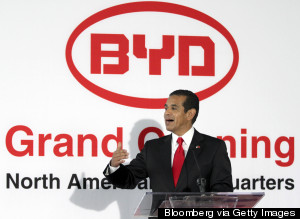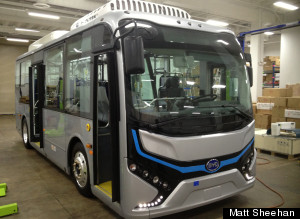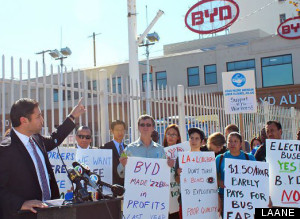
Few individuals or institutions have the power to truly move markets like Warren Buffett and the Chinese government. When the two forces converged in 2008 to back Chinese electric car company BYD, the little-known brand rose to international fame. Buffett's Berkshire Hathaway put $230 million into buying a 10 percent stake in the company, and the Chinese government soon followed up with audacious targets for skyrocketing electric car production.
BYD, which stands for Build Your Dreams, was poised to become the first Chinese car company to make a splash in international markets. So when the privately-owned firm made its first foray into the United States in 2011, no one expected it would fall quite as hard as it did. BYD’s big coming-out party marked the beginning of a new, uglier narrative for the company: a PR and business quagmire that continues today.
But back in 2008, BYD was at the top of its game and Buffett saw something he couldn't resist: an innovative Chinese company with the potential to capture fast-growing markets for green technology. His right-hand man at the time came back from China saying he had "never seen anything like" Wang Chuanfu, the company's founder and CEO. He described Wang as a combination of Thomas Edison and former General Electric CEO Jack Welch: a perfect blend of technical prowess and business acumen.
Wang, a chemist by training, had built BYD into the largest manufacturer of cell phone batteries in the world before turning his attention to auto markets. Combining its rechargable battery and solar technology with its budding business in gasoline-powered cars, BYD brought the first fully plug-in electric vehicle to the Detroit auto show in 2008.
"This was the first company that envisioned the entire solution," BYD executive Micheal Austin told The WorldPost. "Chairman Wang had envisioned the entire zero-emission ecosystem and then he began thinking about replicating that system for transport and residential systems."
Between 2005 and 2008 BYD's revenue more than quadrupled, and by 2010 Businessweek ranked it as the eighth most innovative company in the world. Just a year after Buffett's initial investment, he had made more than a billion dollars.
Basking in that prestige, BYD began considering expanding to American markets. And California politicians, eyeing Chinese investment as the key to economic rejuvenation, conjured up a bevy of incentives to lure the company to their state. Leaders at the state and local level hoped BYD would bring Chinese money and clean-tech manufacturing jobs to American soil.

On Oct. 24, 2011, BYD opened its North American headquarters in Los Angeles to the applause of officials and investors from both China and the U.S. All sides heralded the dawn of a new era.
"We see BYD's Los Angeles opening as a catalyst that will usher in good jobs, global investment and a more sustainable future," Mayor Antonio Villaraigosa said at the ribbon-cutting ceremony.
But since that day, BYD and its U.S. backers have seen the good, the bad and the ugly of Chinese investment in America. After winning contracts to build the first all-electric bus fleets in Long Beach and Los Angeles, the company stood accused of everything from manufacturing unsafe buses to giving away jobs reserved for Californians to Chinese laborers and paying them a mere $1.50 per hour. The company has fought back against the explosive allegations and won, forcing California to drop the wage charges. But today BYD again finds itself on the ropes, with the Federal Transit Administration effectively forcing the cancellation of one of its landmark contracts on a technicality.
The story of how BYD's American dream turned into a PR nightmare weaves together the threads that will bind America and China's economic future. California politicians have been at the cutting edge of a nationwide push for Chinese investment in recession-hit communities from Texas to New York. Just as local politicians see economic salvation in Chinese investment, Chinese companies are seeking validation in U.S. markets and innovation through American partnerships.
On the surface it's a win-win scenario, but one that can quickly be torn apart by the multitude of local political, labor and business interests seeking a voice in the debate and a piece of the pie.
BIRTH OF A BATTERY GIANT
BYD had been quietly infiltrating the digital lives of American consumers for more than a decade before Buffett helped launch the brand onto the global stage. Wang started the company in 1995 as a manufacturer of cell phone batteries, and the upstart rapidly captured a chunk of the growing market. BYD America's vice president, Micheal Austin, first encountered the company in the early 2000s while seeking suppliers for Motorola.
"We went to China and did a very thorough investigation of the battery supply industry and only two manufacturers out of 35 that I visited were not infringing on Japanese patents, and BYD was one of them," Austin said.
The company quickly expanded its scope of operations to include 70 percent of the total content of Motorola Razr phones.
Several years later, in 2003, the company took what appeared to be a U-turn when it bought a failing Chinese state-owned auto manufacturer. But that purchase gave Wang a shortcut into an industry he hoped to transform: electric and hybrid cars. Wang, who still plays an active role in BYD labs, planned to use the company's technical expertise in battery technology to build energy storage systems that could power a car or a home. Though the company spent many years cranking out solely cheap gasoline-powered vehicles, by 2008 it was ready to display its first all-electric models, and the timing couldn't have been better.
In response to the global financial crisis, the Chinese government had opened the floodgates of lending for a variety of industries, including solar and electric vehicles. It set an ambitious goal in 2009 of upping Chinese production capacity for hybrid and electric cars from 2,100 in 2008 to 500,000 in 2011. BYD seemed poised to deliver on that promise and reap the profits for years to come.
The excitement over the increase in production, combined with Buffett's large investment, bubbled over into plans for opening a headquarters and string of dealerships in the U.S. Again, the timing proved impeccable. With banks and businesses in America scaling back in the face of tight credit and withering consumer demand, BYD’s planned investment seemed like a beacon of hope on the horizon.
Chinese investment in green technology had already seized the global spotlight when government subsidies helped the Chinese solar panel industry capture 60 percent of worldwide market share in 2010. China's edge in green manufacturing proved a potent political symbol: President Barack Obama and his cabinet frequently invoked the specter of Chinese competitors in advocating support for U.S. clean-tech manufacturers. By enticing BYD to set up shop in California in 2011, local politicians appeared primed to flip the script on America’s prolonged loss of manufacturing jobs to low-cost Asian competitors like China.

At that time, demand from upwardly mobile Chinese consumers and investors had begun breathing life into other California markets, from alfalfa products to Palo Alto properties to higher education, and California politicians were just starting to realize the job creation potential of Chinese investment. Foreign direct investment from China had been growing by more than 20 percent in recent years, and California leaders, including Govs. Arnold Schwarzenegger and Jerry Brown, were teaming up with enterprising mayors such as Antonio Villaraigosa in Los Angeles to begin an aggressive courtship of Chinese firms.
When BYD began scouting U.S. locations in 2009, it was Villaraigosa who launched a campaign to bring the firm to the city. With the unemployment rate in Los Angeles County hovering around 12 percent and local businesses reluctant to expand, city officials looked to Asia for investment.
Los Angeles was competing with other California cities like the Bay Area’s Cupertino, but it won the day with an innovative package of money and publicity. The city used federal stimulus funds to gift BYD $1.6 million toward renovating its LA facilities, and also offered to display BYD vehicles at the airport and even find a celebrity to drive a BYD car to the Oscars.
In return for the grant, BYD signed a contract promising to create 58 full-time jobs by August 2015, with half of those jobs going to Los Angeles residents, many of them low-income. In its own publicly-released "Employment Action Plan," BYD predicted hiring 102 full-time workers by the fall of 2013.
SWITCHING GEARS
While officials in China and California toasted to BYD's future, the company's stock prices were bottoming out. After soaring on the heels of the Berkshire Hathaway purchase, BYD stocks and profit fell by more than 80 percent in 2010 and 2011, as sales of its gasoline-powered vehicles slumped and investments in new energy markets failed to pay off.
The Chinese government's 2011 prediction of 500,000 new energy vehicles by 2011 had also fallen flat: Only 8,159 hybrid and electric cars sold that year.
"Wang Chuanfu got out ahead of himself, and I think he's come back down to earth," said Greg Anderson, author of Designated Drivers: How China Plans to Dominate the Global Auto Industry. "They expanded dealerships insanely fast and they've kind of pulled back on some of that now."
BYD began to rethink its ambitious plans for U.S. expansion. In addition to the difficulties of pushing new technology into consumer markets, the company came to realize that it faced an uphill battle in the U.S. against consumer and industry skepticism about made-in-China vehicles.
"When we went to the auto show in 2008 all of the Chinese vendors were placed in the basement," said Austin of BYD America. "It shows you the respect that the auto industry had for the Chinese brands."
Recognizing these difficulties, BYD changed gears in 2011 to focus on a more accessible market segment: electric buses.

"The issue with entering the car market is that it's the American dream. If you threaten the American dream you are putting yourself up against a real wall," said Matt Jurjevich, a market researcher with BYD America. "We decided that if we're looking to make an effective entry into the market, the bus and transit industry is the way to do it. You can affect the most amount of people daily and you can affect the grid the fastest."
BYD hoped the pivot to electric buses would help it establish a reputation in the country without having to remold individual consumer perceptions.
"They've picked out a niche where there's not a lot of foreign competition but there is a lot of interest," Anderson said. "Rather than have to persuade consumers one at a time to buy their cars, they're just dealing with fleet managers who are not so concerned about image as they are about cost per mile as well as cutting emissions."
'THE DAY OF AMERICA RULING THE WORLD IS OVER'
Thanks to a "Buy America" provision requiring publicly purchased buses to be assembled in the U.S., BYD's switch to buses also meant it would have to open a manufacturing facility abroad. While searching for a location for a new factory, BYD executives found themselves wooed by Rex Parris, mayor of the desert city of Lancaster, 70 miles outside of Los Angeles.
In 2008 Parris took over a city with an unemployment rate approaching 15 percent and a foreclosure rate that rivaled any in the country. In search of business opportunities and capital to fund them, he decided green technology and Chinese investment could be the key to revitalizing Lancaster. Parris, who says Chinese economic reformer Deng Xiaoping is his personal hero, ordered the city staff to take Mandarin lessons and personally flew to China several times to court BYD and other firms.
"The day of America ruling the world is over, just over," Parris said. "If we're going to compete we'll have to start treating other countries respectfully and we really haven't, especially Asian countries. They're doing us a favor. We're not doing them the favor. We're the ones who need the jobs."

Parris' persistent pursuit of BYD paid off in April 2013 when California Gov. Jerry Brown announced plans to build the Lancaster factory during a visit to BYD's headquarters in Shenzhen. Parris' office had helped BYD acquire a failing RV manufacturing plant that could be easily converted for bus production, including the option to purchase surrounding land as the company grows.
By mid-2013, the mayors of Lancaster and Los Angeles, as well as two consecutive governors, had given their ringing endorsement of BYD and the company had won a small contract to supply electric buses to Stanford University. California was starting to feel like a second home for the company, which had relied heavily on bus and taxi orders from sympathetic local governments in China. Now the enthusiastic embrace of California politicians appeared to smooth the road ahead in the U.S.
Yet the company was woefully unprepared for the complex civic-business environment it faced in Los Angeles County, a landscape populated by a diverse array of local politicians, newspapers, interest groups and competitors.
FROM POLITICAL EMBRACE TO PR FIRESTORM
The trouble began with BYD's first major orders in early 2013: 10 all-electric buses for Long Beach Transit, followed by a contract with LA Metro for up to 25 buses. BYD won the Long Beach contract over South Carolina-based Proterra, a manufacturer that had gained the vocal support of some local transit officials and newspapers that wanted Long Beach to support an American firm.
That public rift led to intense scrutiny, and local media glommed onto the story. News outlets detailed each glitch -- including cracks near the rear door -- as a BYD bus proceeded through durability testing, and they frequently attacked the selection of BYD over Proterra. Criticism even led to a multi-month interruption in BYD's durability tests; last summer, the government temporarily pulled federal funding during a dispute over whether the buses purchased by Long Beach matched the bus undergoing testing.
But this was all a precursor to the real PR nightmare ahead: accusations that BYD had violated minimum wage laws, bringing in Chinese laborers and paying them $1.50 an hour to work in the American facilities.
In October 2013, investigators for the California Labor Commissioner's Office acting on a tip conducted a surprise inspection of BYD's facilities in Los Angeles and Lancaster. Based on that inspection and resulting interviews, the office slapped nearly $100,000 worth of fines on BYD for a combination of minimum wage, pay stub and rest break violations.
But worse than any fine was the narrative building from the incident: a Chinese company given government money to create American jobs is instead flying in temporary Chinese laborers and paying them pennies.
The earliest allegations regarding BYD underpaying its Chinese workers originated in a lawsuit filed by Sandra Itkoff, BYD America's former vice president of strategy. After being fired from BYD in 2012, Itkoff sued the company for wrongful termination and discrimination. In a written complaint filed one month before the commissioner office's inspection, Itkoff claimed that she'd been excluded from all-Chinese staff meetings, that BYD buses were riddled with safety issues, and that BYD brought cheap labor from China to its Los Angeles headquarters, paying workers $5,000 to $8,000 per year.

Local press and activists were up in arms. Advocacy groups organized a protest outside the company's headquarters. Activist Madeline Janis accused the company of "hiding abusive treatment of Chinese workers and substandard electric buses behind a false promise to provide good jobs and clean transportation to Angelenos." Janis' organization, Los Angeles Alliance for a New Economy, and several media outlets called on Long Beach Transit and LA Metro to sever its contracts with BYD.
But as the public firestorm reached fever pitch, the Labor Commissioner's Office abruptly reversed course. BYD submitted documents showing that its Chinese employees in LA had actually been paid $12 to $16 an hour in Chinese wages, prompting the office to drop the minimum wage citations.
"When the labor raid came, they were expecting a sweatshop with a bunch of workers, and there weren't. There were technicians working on equipment," said Austin of BYD America.
Despite BYD's vindication in court, several outside critics of the company, who requested anonymity due to fear of retaliation, maintain that BYD was underpaying its workers. They suggested that the company was able to outmaneuver the Labor Commissioner's Office by producing documents from Chinese sources that the office had no way of fully investigating.
BYD initially declined to provide documentation regarding compensation for Chinese workers or contact information for any of the temporary Chinese employees to protect the privacy of its workers. After publication of this article, a BYD representative extended HuffPost the opportunity to review the documents, but only in person at offices in Los Angeles, which was not possible.
Lanny Davis, attorney for BYD, also told HuffPost that "BYD’s attorneys spent weeks presenting documentation to the Labor Commissioner’s office, including bank statements and proof of payments, and after much study and careful review, the California Labor Commissioner’s attorneys and investigators agreed that BYD paid the five temporary Chinese workers above California’s minimum wage."
Although the commissioner's office backed off on the minimum wage citations, it still stuck BYD with a $1,900 fine for paying the temporary workers in RMB rather than dollars. Citations involving incomplete pay stubs and rest breaks remain under appeal. BYD attorney Lanny Davis issued a scathing assessment of the office's findings.
"This is not a 'Saturday Night Live' satire of bad government; this is for real," he told The WorldPost. "Is it possible that a bureaucracy does such unnecessary things to a start-up company that is the reverse of the narrative that everybody complains about?
"You would think that the state of California would say to the labor commissioner, 'Are you kidding? $1,900 because they paid in RMB rather than dollars? Aren't we trying to attract foreign investment?'"
THE FINAL STRAW
When the dust finally settled on the minimum wage debacle, the company found itself still in possession of its two key contracts: Long Beach Transit and LA Metro. Although the road ahead appeared clear, in December the Federal Transit Administration blocked Long Beach Transit from using a federal grant to purchase BYD buses.
The FTA said that at the time of bidding in 2013, BYD was not yet in compliance with the FTA's Disadvantaged Business Enterprise policy. This requires bidders on federally funded contracts to set percentage goals for the amount of business they will likely conduct with companies owned by minorities and women.
In response to the FTA’s decision to block funding, BYD and Long Beach Transit were forced to cancel the 10-bus contract last week and put it up for re-bidding. BYD intends to participate in the new round of bidding, but given the controversy over the past year, that process may put Proterra in a strong position to take over.
The South Carolina-based company also recently took on a powerful ally: Ray LaHood, former secretary of transportation and overseer of the FTA under President Obama, joined the company's board of directors in February. While working in Obama's cabinet, LaHood wrote glowingly about a visit to Proterra on the White House blog.
"In 2009, Proterra did not have the financial resources or customer orders to commercialize its fast charge battery bus," he wrote. "But with help from Department of Transportation grants to transit agencies across the country, Proterra has been able to make that leap."
BUILDING A GLOBAL BRAND
BYD's American soap opera is far from over, but its story thus far is a cautionary tale for Chinese expansion in the United States. Mayor Parris of Lancaster, who maintains that BYD will grow to be as big as General Motors and Toyota, said there are deep-seated problems with the way America handles Chinese investment.
"If we want to bring those jobs back we have to recognize that we don't get to call all the shots, that it has to be fair both ways," Parris said. "You're putting every obstacle in front of it, and at the same time complaining about China's obstacles."

Some analysts also point to BYD's own ineptitude at dealing with local political and civic forces rarely seen in China. Confident that its powerful political backers could pave the road to success, the company was caught flat-footed when confronted by local opposition.
"In China when you work with the central or provincial government, you can pretty much get things done; they can just make the command and do it," said Stanley Kwong, managing director and professor of the China Business Studies Initiative at the University of San Francisco. "In California it doesn't matter if you get [Senators] Barbara Boxer and Diane Feinstein along with Governor Jerry Brown, people still might not listen to you at a local level."
Strained relationships with local activists helped reinforce the narrative that the company was failing on its job promises. Madeline Janis of LAANE said that her organization was rebuffed when it approached BYD about its obligation to create jobs for low-income Los Angeles residents. In response, BYD claims that it now employs around 50 workers between its Los Angeles headquarters and Lancaster plant, and said that it's well on its way to meeting its contractual obligations with the city of Los Angeles.
"The critics like to scream bloody murder, saying 'BYD got all this tax money, and for what? They were supposed to create 100 jobs,'" said Austin of BYD America. "Everybody has business plans, but we had a contract and that was for 58 jobs by August 2015."
But those clear-cut obligations became obscured by BYD's bolder predictions of hiring more than 100 workers by the fall of 2013, and the bad publicity on "broken promises" has stuck in local media.
Reacting to early criticism about job creation at BYD, former Los Angeles Deputy Mayor Austin Beutner, who headed up Mayor Villaraigosa's outreach to the company, put the company's performance in a long-term perspective.
"Things like this are about planting seeds," Beutner told Bloomberg when the Los Angeles headquarters opened. "Some grow fast, some grow slow, but you've got to plant them."
Outside the U.S, BYD has seen similar ups and downs in its international expansion. While the company saw major growth in profits in 2013, a large contract for electric taxis in London fell through in February. Struggles in the developed world may be balanced out by growth in developing markets: BYD executives recently announced plans to build a bus manufacturing plant outside Sao Paolo, Brazil, that is capable of producing 4,000 buses per year to supply South American contracts.
For its part, BYD said that it remains confident in its technology, pointing to the fact that it has built more than 1,000 electric buses and sold them everywhere from Malaysia to the Netherlands.
"I think it speaks a lot to the American marketplace that we've had a lot of trouble here but done so well in other places," said Matt Jurjevich of BYD America. "It might just happen that our brand develops globally before it develops in America."
CORRECTION: This article originally stated that Jack Welch was the former CEO of General Motors instead General Electric. It has also been updated with additional quotes from BYD's legal representative.
